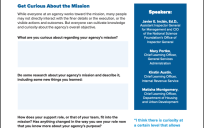All of us start somewhere. As a GS-15 looking back on 20 years in federal government, I had some amazing mentors and supervisors — and some not-so-amazing folks in my professional life. There are many basic skills younger feds could benefit from knowing early by asking a trusted advisor for advice and steps.
Here are a few things I wish I’d tackled earlier in my career through on-the-job training or by simply asking questions.
1. How to Advocate for Myself
No one cares more for your career development than you. I spent the early years of my career thinking my boss should be finding educational opportunities on my behalf because he or she knew more about what existed and what made sense. Nothing could be further from the truth. Everyone in our organizations are busy, focused on their own goals and tasks, and doing their best to make it through every day.
2. How to Approach a Performance Appraisal Discussion
Most of us received training on how to write a self-assessment for our performance appraisals, but not how to articulate our goals, accomplishments, and hopes for our careers. The performance management cycle should last all year — not just at the mid-year and end-of-year points. Asking for what you want in the year to come and explaining the value you brought to your organization in the year past takes savvy and poise. Rarely do we receive direct advice on how to do this well, and we improve only through trial and error.
3. How to Run a Meeting
You don’t have to be the one in charge of the meeting to run a meeting. Even as a very junior employee, you can control the rhythm of an event by keeping the time, taking the notes, understanding everyone’s position, and preparing the principal well before the meeting. And he who writes the notes, creates the reality. Which leads me to the next point.
4. How to Take Good Meeting Notes
My tactic is still to write down everything that’s said as close to how the speaker actually said it and later, when I have time to shape the narrative, edit down so only the main points remain. Distilling hours of chatter into a few salient points takes practice. And crafting the “to do” list after a meeting often means more than speaking during the meeting itself.
5. How to Write a Compelling Speech
I was still a single-digit GS employee when asked to write a speech for one of my superiors. I got no training or guidance on how to shape it, how to elicit from my boss what his goals were, and who would comprise the audience.
6. How to Stalk Calendars and Task Tracking Systems
If you stalk someone’s calendar well, you should understand his or her priorities better than then they do. What meetings your boss attends versus which they delegate speaks volumes. Who gets into the office for coaching or mentoring? Who does the boss cancel on often? What message does the boss send by working late every day (or leaving on time to spend time with family)? Who never takes leave? Get in the details and patterns emerge.
Also, if you are junior in your organization, master your agency or department’s task management system. I learned more about passing tasks to their rightful owners and seeking training opportunities by digging into what came through the task system than I did working with the admin folks who actually assigned tasks in one of my earlier jobs. If you don’t know the system inside and out, you can’t use it to your best advantage.
7. How to Amplify Other People’s Voices
Often, the person who knows the most sits at the bottom of the food chain. Providing appropriate, well-timed support to a colleague who has the right answers not only helps the collective achieve goals and objectives, but it helps amplify the voice of someone who perhaps hasn’t been given the opportunity.
8. How to Tell Someone They’re Wrong Without Making Them Feel Small
And on the flip side, true leaders know how to correct someone’s factual errors without belittling them. So often, senior staff treat folks who simply have less knowledge as stupid or ignorant. More likely, the seniors benefit from exposure to a much wider breadth of information. Gently correcting someone or steering the conversation in another direction maintains positive momentum. We often fail to remember the subject matter in a meeting in which someone got cut off at the knees, but we definitely remember the insult.
9. How to Explain My Job to My Mom
Understanding the mission of your agency and how you contribute to that mission seems simple. However, try explaining a highly technical job to your parent or grandparent who worked in a different field. Crafting an elevator pitch to explain what you do and why helps everyone grasp the importance and impact of your career and how you support citizens.
10. How to Say No to Opportunities When the Timing Isn’t Right
Too often I took jobs because my leadership chain or my boss asked me to, rather than because the specific job excited me or could produce tangible benefits for me. Certainly, we all take on work at times for the good of the organization and not our own benefit. However, knowing when to say “no” and stick to that decision without guilt should be a skill you cultivate.
Love Rutledge hosts the FedUpward Podcast (FedUpward.com), a show for feds to find tips and strategies to navigate everyday problems. She has 20 years of government service, a master’s in public administration from the George Washington University and a Master of Science in defense resource management from the Eisenhower School at the National Defense University. She’s also a wife and mother of two preschoolers for whom she’s trying to figure out childcare right now. Opinions expressed are hers and not those of the government.
This post originally appeared in slightly different form on July 28, 2020.





Leave a Reply
You must be logged in to post a comment.